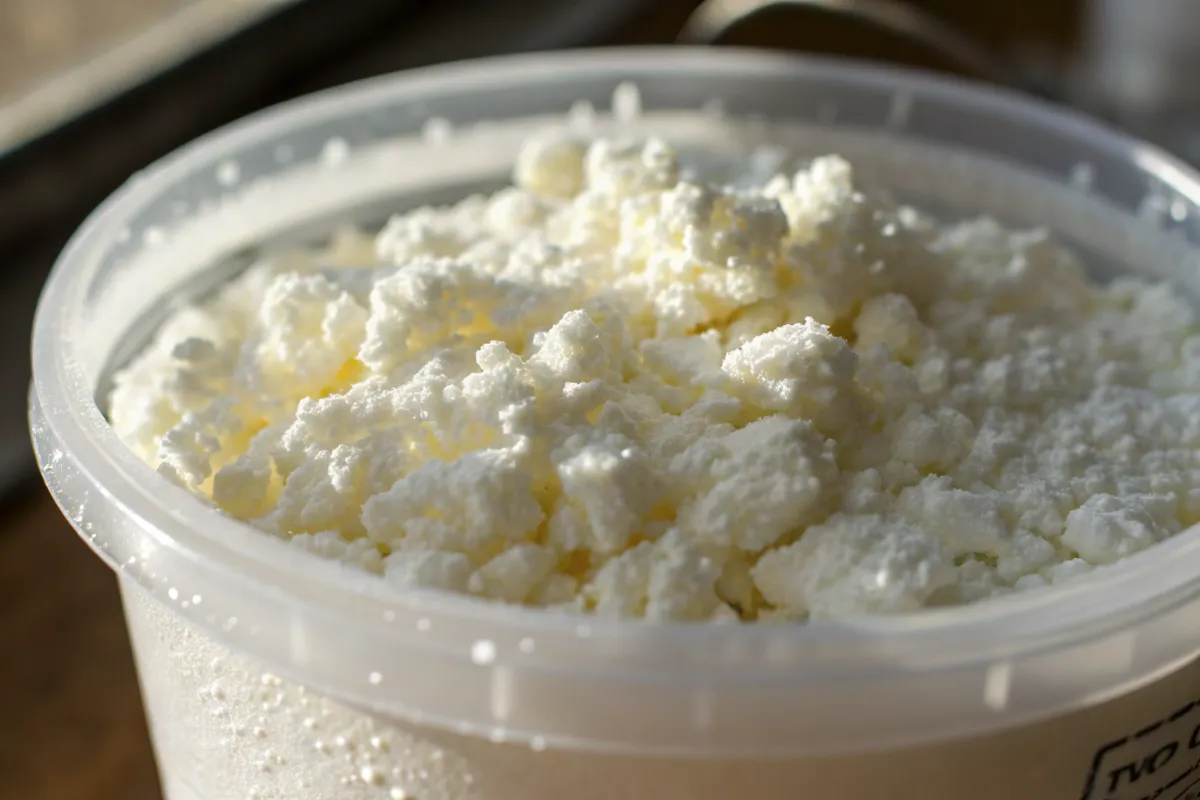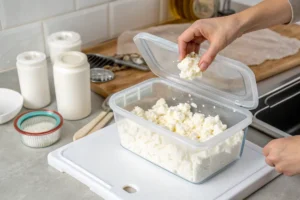introduction:
Can you freeze cottage cheese? The answer is more nuanced than a simple yes or no. This article explores how freezing affects cottage cheese texture, usage, and storage.
The Impact of Freezing on Cottage Cheese
Understanding Cottage Cheese Composition
Cottage cheese, a fresh cheese, has a high water content. This makes it different from aged cheeses. Freezing cottage cheese can change its structure. The high water content turns into ice crystals. These crystals can break the delicate curd structure. Consequently, when thawed, the texture may become grainy.
Textural Changes After Freezing
After freezing and thawing, the texture often becomes less smooth. This is because the water separates. It creates a watery, curdled consistency. Therefore, the once creamy texture is lost. This change makes the cheese less desirable for some uses. However, the flavor usually remains unaffected. Consequently, if texture is not important, it can still be used.
How to Freeze Cottage Cheese
Best Practices for Freezing Cottage Cheese
If you choose to freeze cottage cheese, proper technique is important. Doing so can minimize textural changes. Here are some guidelines to follow. First, choose airtight freezer-safe containers. This will help prevent freezer burn. Also, divide cottage cheese into portions. Small portions thaw faster and more evenly.
Using Freezer-Safe Containers
Use containers that are designed for freezing. Glass jars and plastic containers work well. Ensure they are airtight to avoid moisture issues. Furthermore, leave a little space at the top of the container. This allows for expansion during freezing. Then, the cheese should be thawed in the fridge before using it.
How Freezing Cottage Cheese Affects Its Use
While you can freeze cottage cheese, the altered texture limits some uses. It may not be ideal for topping salads or serving as a side dish. However, it still works well in recipes where texture is less critical. For example, use it in cooked dishes like casseroles and baked goods.
Uses for Thawed Cottage Cheese
Cooking and Baking with Frozen Cottage Cheese
Thawed cottage cheese works very well in cooked recipes. It adds richness and protein to dishes. Therefore, it can be used in lasagna, pancakes, and other baked foods. Also, it is great for smoothies and dips that will be blended. The change in texture won’t be noticeable.
Avoid Using Thawed Cottage Cheese in Some Dishes
Avoid using thawed cottage cheese in fresh salads. Similarly, it’s not ideal as a topping or in recipes where smooth texture is needed. Due to the curdled texture, it is not appealing. Therefore, it will affect the visual appeal of those dishes. Consequently, be mindful of its usage.
Freezing Cottage Cheese: Pros and Cons
Benefits
Freezing cottage cheese can extend its shelf life. This is a great option when you can’t use it before it expires. It also helps reduce food waste. Furthermore, it is good for those who buy in bulk. Therefore, it can be a money-saving approach.
Downsides
The biggest downside to freezing cottage cheese is the change in texture. The once-smooth curdles and becomes watery. Also, the cheese will take time to thaw. Thus, you need to plan in advance. Furthermore, it may not be suitable for every recipe. Consequently, one must be aware of the effects.
Alternatives to Freezing Cottage Cheese
Storing Cottage Cheese Properly in the Refrigerator
The best way to store cottage cheese is in the fridge. Always keep it tightly sealed. This will keep it fresher for longer. Also, keep it in its original packaging if possible. Then, use it within the recommended time frame. In addition, check the “use by” date on the package.
When to Buy Smaller Cottage Cheese Containers
Another way to avoid having to freeze cottage cheese is to buy smaller containers. Buy the size you can use before it expires. This ensures that you don’t have to freeze it. Also, small sizes are often available. Furthermore, you will always have fresh cheese. Therefore, you won’t have to rely on frozen product.
Freshness and Quality
Buying small sizes helps with quality and freshness. Then you can have the best taste. It reduces the chance of wasting uneaten food. Therefore, freshness is important for taste.
Tips for Using Cottage Cheese in Recipes
Incorporating Cottage Cheese into Various Meals
Cottage cheese is quite versatile. Use it for breakfast, lunch, dinner, and snacks. Add it to your smoothies. Also, add it to your scrambled eggs. Additionally, use it in baked dishes and casseroles. You can also use it as a topping. Consequently, cottage cheese has many uses.
Enhancing the Flavor of Cottage Cheese
You can add flavors to your cottage cheese to make it more enjoyable. Add fruits, nuts, and seasonings. Furthermore, add herbs, pepper, and other spices. Then, mix it with honey or maple syrup. Consequently, it becomes a great meal or snack option.
Recipes That Feature Cottage Cheese
Many recipes feature cottage cheese. Try using it in pancakes and waffles. Also, it works great in dips and spreads. Moreover, it is a great addition to lasagna and other pasta dishes. Then, it can be added to various baked goods. Therefore, you will find many options.
Understanding Cottage Cheese Quality
How to Assess Cottage Cheese Freshness
Look at the texture and color of the cottage cheese. Fresh cheese is creamy white and has a consistent texture. Then, if it is watery or discolored, it may not be fresh. Always smell the cheese before using it. A sour smell indicates it has gone bad. Additionally, check the expiration date on the package.
What Affects the Quality of Cottage Cheese
The quality of cottage cheese is affected by several factors. These include storage temperature. Also, time since production and handling also make a difference. Keep cheese refrigerated and avoid contamination. Furthermore, buy from reputable sources. Thus, the quality is preserved.
Tips to Avoid Spoilage
Keep cottage cheese refrigerated in an airtight container. Avoid leaving it at room temperature for too long. Then, always use a clean spoon to avoid cross-contamination. This will prevent the growth of bacteria. Moreover, always follow the expiration date on the package.
Can you freeze cottage cheese?
Nutritional Value of Cottage Cheese
| Nutrient | Amount |
|---|---|
| Calories | 120 |
| Protein | 14g |
| Fat | 5g |
| Carbohydrates | 5g |
| Calcium | 80mg |
Protein Content in Cottage Cheese
Cottage cheese is a great source of protein. It has all nine essential amino acids. Therefore, it is beneficial for muscle health and recovery. Also, it promotes satiety. Furthermore, the protein content makes it a good choice for athletes. Consequently, it is a healthy choice.
Other Nutrients Found in Cottage Cheese
Cottage cheese contains other nutrients. These include calcium, vitamin B12, and phosphorus. These nutrients are needed for bone health. Also, these help with energy production. Additionally, it is a good choice for a balanced diet. Consequently, it provides various health benefits.
Benefits of Eating Cottage Cheese
Eating cottage cheese can help you manage your weight. It can also support bone health and digestion. The protein helps you feel full longer. Moreover, the nutrients contribute to overall health. Therefore, it’s a great option for those seeking a healthy diet.
Can you freeze cottage cheese?
Final Thoughts: Can you freeze cottage cheese?
Summarizing the Key Points About Freezing
Freezing cottage cheese is possible, however, it is not ideal. It changes the texture of the cheese making it less desirable for certain uses. Accordingly, its best used in dishes where texture doesn’t matter. Therefore, it is important to know how to use it after thawing.
Considering the Alternatives
If you prefer the best quality, keep cottage cheese in the fridge. Purchase smaller sizes to avoid waste. Then use it before the expiration date. This helps maintain the texture and flavor. Consequently, you can have fresh cheese all the time.
Making Informed Decisions About Cottage Cheese
Knowing the effects of freezing can help you make informed decisions. Think about how you will use it before freezing. This will help you maintain food quality. Therefore, plan ahead and use it wisely.
Frequently Asked Questions (FAQs)
Is cottage cheese good after being frozen?
Generally, cottage cheese is safe to eat after being frozen. However, the texture will change, becoming grainy and watery. The flavor will usually remain the same. Therefore, consider using it in cooked dishes where texture doesn’t matter.
Can you freeze cottage cheese in its original container?
It’s best to freeze cottage cheese in airtight containers. These will help protect it from freezer burn. The original container may not be suitable for freezing. Additionally, transferring it to another container can prevent leaks. Furthermore, it helps with better storage.
How long does cottage cheese last in the fridge?
Cottage cheese typically lasts about one to two weeks in the refrigerator. Always check the expiration date on the packaging. Then, for best results, use it within a few days of opening. Moreover, make sure you always store it properly.
Why should cream cheese and cottage cheese not be frozen?
Cream cheese and cottage cheese have high water content. The water turns to ice when frozen. This can cause texture changes. Therefore, they may become grainy and separated. This makes them less appealing for certain dishes. Consequently, freezing is not recommended for best quality.
conclusion : Can you freeze cottage cheese?
In conclusion, while it’s technically possible to freeze cottage cheese, the resulting changes in texture make it less ideal for direct consumption. The grainy and watery consistency can be off-putting in some dishes. However, the flavor generally remains intact, allowing for its use in cooked recipes, casseroles, and baked goods where texture is not a primary concern. It’s best practice to store cottage cheese in the refrigerator and buy smaller quantities if possible to maintain optimal texture and freshness.
When freezing, using airtight freezer-safe containers and portioning it out can help minimize the negative effects. Ultimately, being aware of these factors and considering the alternatives will help you make informed decisions about freezing cottage cheese, ensuring the best possible outcome for your culinary needs.



